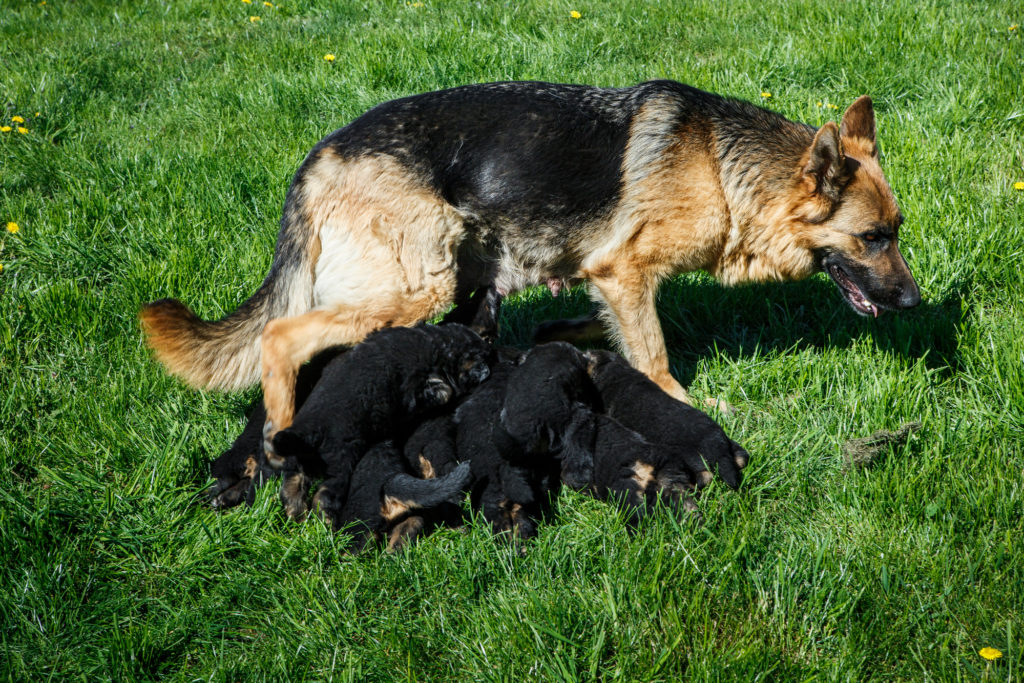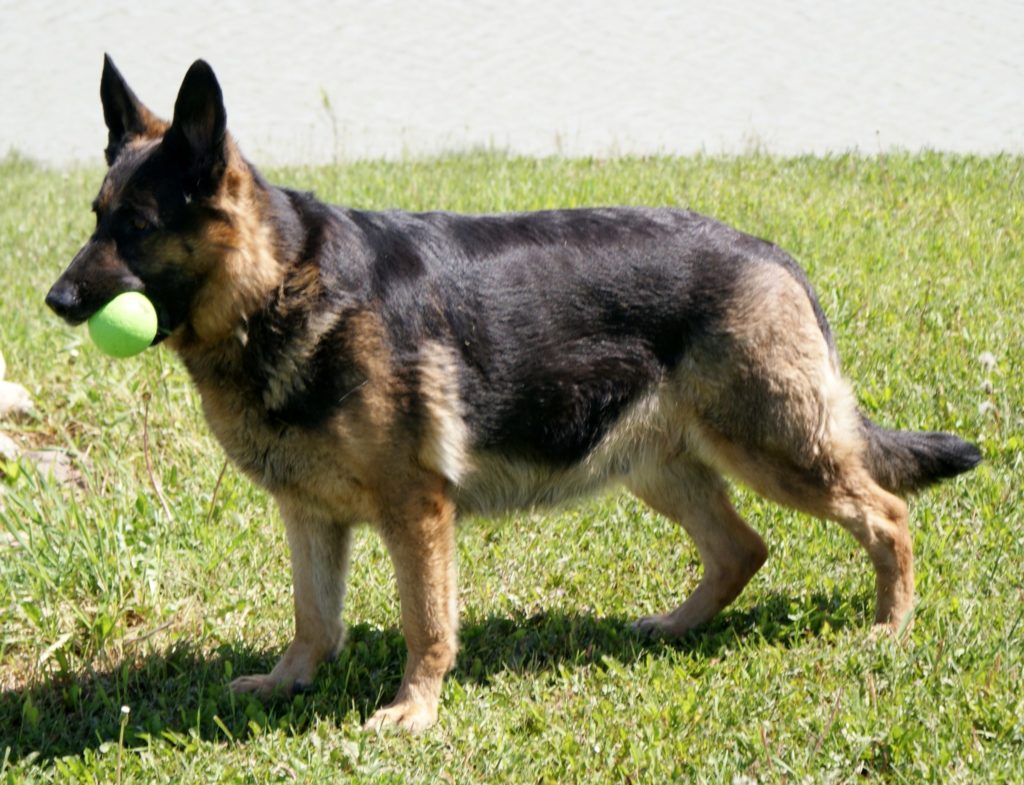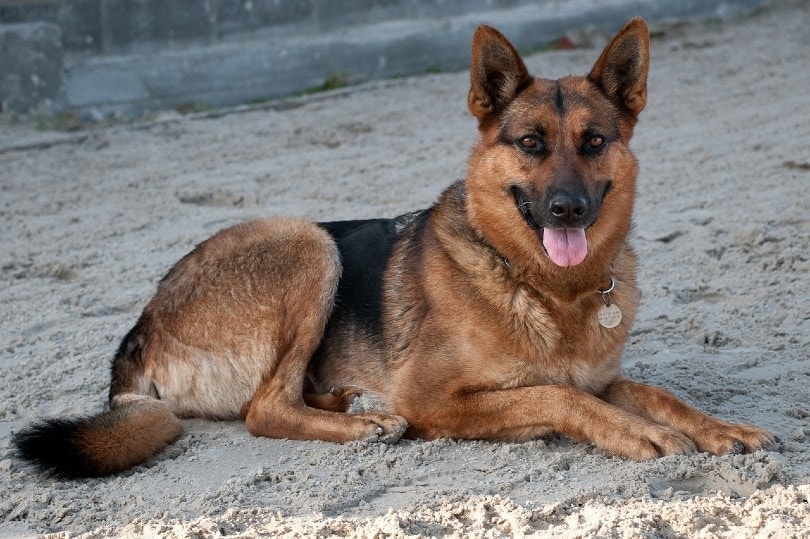Pregnant german shepherds are the good news for pet owners. It is overwhelming to imagine the excitement of expecting another set of German Shepherds from your pet. Some German Shepherd owners are afraid of their furry friends and fearful that they might make mistakes. How long can German Shepherds be pregnant?
It’s better to not wait and watch your dog’s progress than to find out as much as possible about her gestation period in order to be able to help her during this crucial time.
A German Shepherd Dog (GSD) is approximately 63 days gestation. However, the actual duration of pregnancy can vary depending on how long it takes and what process they go through. German Shepherds can be protective, loving, gentle, gentle, and affectionate with their babies.
Contents
- 1 What is the Best Time to get Pregnant With a German Shepherd?
- 2 How Long Does it Take For a German Shepherd to Become Pregnant?
- 3 How Many Babies Are German Shepherds able to Produce?
- 4 German Shepherd Pregnancy Stages
- 5 Taking Care Of German Shepherd Pregnancy Week By Week
- 6 How to tell if your German Shepherd is pregnant
- 7 What is the reason German Shepherd Dogs Nest during Pregnancy?
- 8 How to Take Care of a German Shepherd Pregnant
- 9 Final Verdict
- 10 Pregnant German Shepherds F.A.Q.
What is the Best Time to get Pregnant With a German Shepherd?
The first heat cycle is when a female German Shepherd is pregnant. This varies from one breed to the next. German Shepherds that are larger in size usually experience their first heat between 9 and 12 months of age, while smaller dog breeds may have their first heat within 6 months of their birth.

Your German Shepherd may be more active or less hungry during a heat cycle. Your dog may become aggressive or moody due to the fact that she is bleeding. You should be gentle and allow your pet to be. Your German Shepherd will not be ready to breed before she turns two years old, regardless of when she has her first heat cycle.
How Long Does it Take For a German Shepherd to Become Pregnant?
A German Shepherd’s normal pregnancy time is around 63 days. German Shepherds are a larger breed, so their pregnancy may take slightly longer than other breeds.
You will need to closely monitor your German Shepherd’s progress during pregnancy to accurately determine her chances of having a baby. This should be done from the beginning of her first heat cycle until the end of the heat period. Keep track of the date and time so you can track when your dog conceived a puppy. Your German Shepherd’s due dates can be found around 63 days after their gestation period.
How Many Babies Are German Shepherds able to Produce?
German Shepherds are able to have as many as 8 puppies. Some females with larger litters may produce as many as 15 puppies. The number of GSD litter produced depends on the pet’s health and breed. The number of babies a small or less healthy breed will have is usually lower than 8.

The health of the pregnant German Shepherd may have an effect on the puppies. A German Shepherd’s female litter size can be moderate to large if the mother is fed a healthy diet, exercise daily and visits to the vet regularly. The overall health and well-being of the litter is also a major factor. A male German Shepherd who has a lower number of sperm is more likely to have more puppies.
German Shepherd Pregnancy Stages
Let’s talk about german shepherd pregnancy timeline week for week.
Week 1
Most likely, the first week of pregnancy will occur without you knowing. You won’t know when the puppies were born, even if you do know.
If you don’t know that your dog has conceived, you won’t know. The eggs will be fertilized the first week and then her reproductive system kicks into gear.
Because it is so new, you are unlikely to notice any behavioral changes. Your dog may not even be aware of the change.
Week 2 and 3
You will notice changes in your German Shepherd’s pregnancy during the second and third weeks. The fertilized eggs will attach to the lining of your uterus during the second week. This is the endometrium.
This is when the dog’s hormones really kick in and you will likely notice more changes. Your German Shepherd’s nipples will likely grow in size and color during the third week.

Your German Shepherd may be pregnant at first, but it is possible for the abdomen to begin to swell. It should appear like your dog is adding weight.
You may feel moody at this stage, but it is more common to experience lethargy than major behavioral changes.
You can expect your dog to have a greater appetite. Your vet can help you decide the best food for your dog if you are aware of the pregnancy.
Week 4
Your German Shepherd will experience a surge in hormones after she reaches her fourth week.
Although this is meant to help her body develop healthy puppies, it can also have side effects. Your dog might be urinating more frequently than usual and will likely drink more.

You might also see vomiting, as it happens with humans. Do not be surprised to see your German Shepherd become nauseated due to the hormone surge. Her body is adjusting to the puppies and this can cause vomiting.
You will also be able to take your dog to the vet to have an ultrasound.
An ultrasound will confirm your pregnancy and let you know how many puppies your dog is expecting. This is an important step because dogs don’t have the same pregnancy tests that humans do.
Week 5 and 6
At this point, your German Shepherd’s stomach should start to show. This is normal. It is normal for your German Shepherd to seem hungrier than usual.
She might even gain 20-50 percent weight. She will be having puppies, and she will require more nutrition and calories than usual. It is crucial to keep her under the care of your vet and get all prenatal advice and guidance.
Your German Shepherd will feel more comfortable by the sixth week. She might not be as willing to walk or run around anymore. You might notice some moodiness.
You will notice that the puppies are growing faster at this stage. A stethoscope should allow you to hear the puppies’ heartbeats.
Your German Shepherd will experience more behavioral changes during this week of pregnancy. Her abdomen will be firm and she will experience some vaginal discharge.
Although the puppies will be quite large by this time, it is still too early to have them. Although they are a large breed you don’t want to have puppies before their due date.
Because she isn’t as comfortable as she was once, and she won’t be as eager to go on adventures with her German Shepherd, her activity level will drop to practically nothing.
Week 8
Your German Shepherd’s eighth week of pregnancy will see her lose her appetite. Because the puppies are pressing on her stomach, your German Shepherd will find it harder to eat.
You will be tired by the time she reaches this stage, so make sure you give her all of your love and attention. As her body prepares for the birth of her puppies, her nipples will also swell and grow enormously.
Also, you should be able to see your puppy’s abdomen move as they reposition.
Week 9
This is the last stage of pregnancy. It means that your pup is close to being born. At this stage, the puppies will be fully formed and ready to move towards the birth canal.
This is when your German Shepherd will likely be unhappy and very restless.
She will likely be looking for a place to nest and wait for her puppies. As much as you can, comfort your dog and make sure she is comfortable in your home. She will be able to deliver her puppies there without worrying. Keep your home as calm as possible.
Taking Care Of German Shepherd Pregnancy Week By Week
It can be difficult to care for a pregnant German Shepherd Shepherd for 63 consecutive days, especially for first-time owners. If you have a plan that breaks down each week of your caretaking strategy, it will be easy to make the whole process seem effortless.

These are some easy-to-follow guidelines on how to take care week by week of GSD pregnancy:
- First Week: Your pet’s veterinarian cannot confirm if your dog is pregnant. There is practically nothing you can do.
- Third Week: Your furry friend will likely become restless after the second week and develop a greater appetite. You should buy high-quality dog toys that are both fun and nutritious. Your dog’s nipples can also grow larger and become darker.
- Fourth Week: You should consider limiting your dog’s physical activity and talking to your veterinarian about what dietary supplements your dog needs. To prevent diseases and infections, you should continue to maintain your grooming routine.
- The 5th Week: Your dog will gain weight. As you gradually reduce the amount of food your pet eats, it will begin to gain weight.
- 6th week: As your pup grows, you will limit the amount of food that your dog can eat at once. You should limit the amount of food your dog can eat at once.
- 7th week: Your puppy will begin to produce milk. This will lead to whelping. You should ensure your dog has a place where she can rest until birth.
- 8th week: You should make sure she does not put too much stress on her body, as she is about to give birth one week prior.
- 9th week: Keep an eye on your dog’s temperature. The puppies may arrive if the temperature drops below 38 degrees Celsius. This can happen between 20 and 36 hours. A few hours before she gives birth, her appetite will decrease significantly.
How to tell if your German Shepherd is pregnant
Sometimes German shepherd pregnancy may not be obvious. German shepherds are well-known for their ability to endure pain.

As a pet owner, it is important to be familiar with gestation periods. Here are the top four signs of German shepherd pregnancy.
- Increased appetite: To meet the needs of her pups, a GSD female will eat substantially more food.
- This means that you need to ensure you have enough dog food in your home. You should also consider purchasing food that is healthy, rather than one that is purely about taste and nutrition.
- Weight Gain There will be an increase in weight in German shepherd pregnancy. This could be a 20 percent increase or a 50% increase.
- Although it may seem overwhelming at first, they will significantly lose weight following the gestation period.
- Frequent Urination A pregnant female dog will mark her territory more often if they are urinating frequently. This is done by urinating at different places.
- Female German shepherds may sometimes perform urine-marking, but you won’t see it very often. They don’t pick the spot to mark, whether it is the couch, the TV, or the corner.
- Personality changes: Finally, you might notice some significant changes in the behavior of your female GSDs. They may become more restless and agitated.
- However, the most common change in a German Shepherd’s personality is their increased aggression. It is mostly due to their maternal instincts.
These signs can be helpful in determining if a German shepherd is pregnant. But there are other surefire ways.
These methods make use of technology and are often performed by veterinarians.
- Hormone tests
- X-Ray
- Ultrasound
- Palpation
You should confirm the German shepherd’s gestation time and prepare to be a caregiver for your pet’s pregnancy.
What is the reason German Shepherd Dogs Nest during Pregnancy?
When female German Shepherd dogs reach the end of their pregnancy, they nest. They nest to ensure their litter arrives in the best possible way.
Your female GSD will nestle and lick her self in anticipation of her pups. It’s normal for your pet to groom herself excessively. Your GSD might feel anxious or uneasy prior to labor. Your GSD may seek privacy and tear up blankets, newspapers or find a safe place to nest her pups.

GSD breeds may even use toys to protect their nest. Your responsibility is to make sure your GSD’s nest is safe. A whelping container is a wonderful nest for pregnant dogs.
German Shepherds nest before they give birth. Professional veterinarians say that pregnant dogs begin nesting nine to ten days before giving birth to pups.
How to Take Care of a German Shepherd Pregnant
Your German Shepherd will need a lot of attention and care during pregnancy. There are many things you can do to make your pregnancy more comfortable and less painful.
- High quality dog food is crucial for the health and well-being of a pregnant dog.
- Dogs should eat more food as they get hungry. However, this should be done gradually.
- You can give it more food at different times and smaller portions. A large amount of food for a female dog can pose a danger to the puppy and its health.
- Regular checkups are necessary for your dog. During the 60-65 days of pregnancy, you must bring your dog to the vet at the very least three to four times.
Final Verdict
Being a responsible parent to a pregnant dog can be a daunting task. You need to be alert and aware of every move of your dog. During pregnancy, you must take extra care of your dog than you would a human being. These efforts are worth it if you love puppies and enjoy playing with them.
Pregnant German Shepherds F.A.Q.
How can I tell if my German shepherd is pregnant?
6 Signs Of Pregnancy In Dogs
Reduced activity. It could indicate that your dog is pregnant if she becomes tired easily or spends more time sleeping. …
Appetite changes …
Unusual behavior …
Discolored or Enlarged Nipples …
Weight Gain and Expanded Abdomen …
Nesting Behaviors
How long does it take for a German shepherd to show she is pregnant?
Usually, this seemingly straightforward process takes about 16 days. Dogs aren’t technically “pregnant” until the puppies embed into the uterine wall. The female won’t show symptoms during this period, as there isn’t anything telling her body that she’s pregnant. The fetus will start to develop around day 22.
How many puppies do German shepherds have first litter?
German Shepherd Dogs may have 1 up to 15 puppies in a regular litter. Although the average litter contains 8 puppies, it is not uncommon to have larger litters.
How long does a German shepherd take to give birth?
Anna Burke, a dog expert, says that German Shepherds can become pregnant for 63 Days. Although there is a possibility that your GSD may give birth to preemies during pregnancy, the average gestation period after conception is 63 days.

